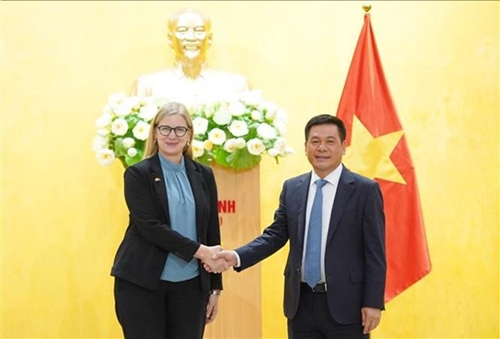At their meeting in Hanoi, Dien said the export structures of Vietnam and Sweden do not compete with but are complementary to each other, which is favorable conditions for their businesses to enhance partnerships and diversify supply chains, particularly of the commodities matching a country’s strength and the other’s demand such as apparel, footwear, wood products, tropical farm produce, and aquatic products of Vietnam and chemicals, pharmaceuticals, paper products, electronic devices, and machinery of Sweden.
Sweden is a high-income country with strong purchasing power as seen in Vietnam’s exports to the European nation exceeding USD 1 billion annually and keep growing.
    |
 |
|
Minister of Industry and Trade Nguyen Hong Dien (right) and Swedish Ambassador to Vietnam Ann Måwe at the meeting in Hanoi on May 9 |
He held that global difficulties and challenges require the two countries cooperate more strongly and effectively, especially in trade and investment, to jointly respond and improve each economy’s resilience.
In particular, they should capitalize on the E.U. - Vietnam Free Trade Agreement (EVFTA) and the E.U. - Vietnam Investment Protection Agreement (EVIPA), he went on.
For her part, Måwe noted Sweden, which takes the lead in innovation and sustainable development in Northern Europe, always hopes to strengthen ties with Vietnam in the fields of energy and sustainable development.
She introduced Ericsson and Hitachi Energy, two major energy firms of Sweden, as well as the prospect of these companies’ supply of energy transition solutions for Vietnam.
The ambassador also informed her host that Swedfund, a development financier of the Swedish government, is willing to help Vietnam, the Vietnam Electricity (EVN) Group in particular, receive sponsorship for researching and developing smart grids.
Dien said implementing the Just Energy Transition Partnership (JETP) agreement is one of the important solutions for energy transition in Vietnam.
However, information about a funding package worth over USD 15.5 billion from developed countries for Vietnam to shift from coal-fired power generation to clean energy remains unclear. Meanwhile, it needs a detailed roadmap and mechanisms to realize ideals and translate commitments into action to successfully implement the JETP.
Vietnam hopes that developed countries, including the E.U. and Sweden, will work out concrete funding packages to assist with its energy transition and soon issue a roadmap and necessary mechanisms to disburse and effective use the sponsorship, the minister went on.
As the two countries will mark the 55th anniversary of their diplomatic relations in 2024, the two officials also expressed their hope that the countries will hold high-level mutual visits and other activities to bolster ties in trade, industry, and energy.
According to the General Department of Vietnam Customs, bilateral trade approximated USD 1.62 billion in 2022, up 6.3% year-on-year. That comprised USD 1.26 billion worth of Vietnam’s exports and USD 353 million worth of imports, respectively, up 5.4% and 9.9%.
In the first quarter of 2023, due to escalating inflation, global recession risks, and lower demand in the E.U., the trade turnover fell 16.8% from a year earlier to USD 331 million, including USD 253 million worth of Vietnam’s exports and USD 78 million worth of imports, respectively, down 16.5% and 17.9%.
As of the end of March, Sweden had 103 valid investment projects worth over USD 680 million in Vietnam, ranking 29th among 143 countries and territories investing in the Southeast Asian nation.
Source: VNA